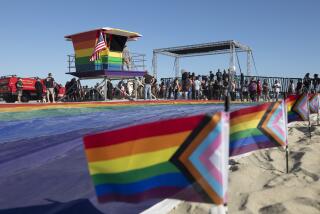Fundamentalists and Gays Share an Interest in Rights : Human rights: Religious belief, like sexual orientation, is irrelevant to job performance, unless an employee makes it relevant.
- Share via
What does Assistant Los Angeles Police Chief Robert Vernon have in common with the thousands of lesbians and gay men who continue to protest Gov. Pete Wilson’s veto of AB 101 (the anti-job bias bill for gays)? This is not a trick question. Two recent lawsuits demonstrate that there is at least one area in which Vernon, as well as those who identify themselves as fundamentalist Christians, and the gay community have something very important at stake.
Vernon has filed a multimillion-dollar lawsuit against the city charging that its investigation into his religious beliefs is an invasion of his rights. According to one of his attorneys, Vernon feels that his reputation has suffered and that his career will also suffer because of the investigation ordered by the Police Commission.
Just a few days before Vernon filed his suit, a state Court of Appeal held that a pre-employment psychological-screening test invades the right to privacy guaranteed by California’s Constitution. In Soroka vs. Dayton Hudson Corp., the court held that the test used by Target stores to screen out security guards who might be psychologically unfit was improper because it asked applicants to agree or disagree with statements such as: “I feel sure that there is only one true religion” and “A minister can cure disease by praying and putting his hand on your head.” It also asked the applicants to agree or disagree with these statements: “I am strongly attracted by members of my own sex” and, for male applicants, “I have often wished I were a girl.”
The court held that such inquiries are unrelated to job performance. It is not hard to see why. A person’s belief in a god is a personal decision that does not necessarily affect his or her ability, dedication or desire to do a job. Similarly, the gender of the person that a worker goes home to, or chooses to date, is equally irrelevant.
The problem for both Christians and gays is that such matters are not entirely private. Jesus’ admonition to his followers that they not hide their light under a bushel demands more of them than just going to church on Sunday. Like lesbians and gay men, Christians are finding that this aspect of their lives is a part of their identity, not just some isolated compartment in their lives. In the course of a day, a person’s religious beliefs can be exposed. An employee asked to perform an act that she or he believes is unethical, such as telling a lie, may wish to explain their resistance.
The employee could say, “I think it’s wrong” and leave it at that. But if there is more to it, why should the worker be penalized for saying, “The Bible says I should not lie”? Similarly, at a conversation during a coffee break, the employee may be asked what she did the night before. Why should she have to hedge about replying that she had attended a Bible study, or volunteered her services distributing food to the homeless?
In this, religious employees are in the same situation that lesbians and gays find themselves in on the job. Despite the pressure to keep such matters private, the most ordinary social activities can wind up exposing them. The fact that an employee visited a friend with AIDS can start rumors that the person is gay. A lesbian who comes to a company picnic without her lover of a decade must lie about this important relationship or face discharge. She does not have the luxury of honesty about this important relationship.
Clearly, there are times when sexual orientation or religious belief may affect job performance. A gay activist who consistently attends gay-rights demonstrations on company time has let his political activity interfere with his work. And a religious person in middle-management who promotes only those who share his beliefs would similarly have violated the principle that promotion should be based on merit. But in both cases it is not the mere fact of sexual or religious orientation that is improper, it is the abuse of the rules everybody must abide by.
Religious fundamentalists, like lesbians and gays, are also more and more frequently becoming subjects of stereotyped notions and biases. The sins of a few, like Jimmy Swaggart, are attributed to everyone in the group. “All Christians” are not like Swaggart any more than they are all like the Rev. Robert Schuller. Each is an individual who deserves to be assessed on her or his merits. The same is true of lesbians and gay men, Latinos and anyone else in our society.
The Soroka decision and Vernon’s suit are evidence that Christians wish to assert the same right that lesbians and gay men are asserting to equal treatment, free of inaccurate stereotypes. Neither group will be content to remain in an economically enforced closet because of such stereotyped notions. Religious belief, like sexual orientation, is irrelevant to job performance, unless an employee makes it relevant. In such cases, the employee can and should be dealt with individually. But stereotypical thinking about minority groups must continue to be constitutionally improper in the workplace.
It defies conventional thinking to suggest that fundamentalists should take time to meet with the gay community regarding common concerns. But their interests are inextricably linked in this area. It is very possible that the state Supreme Court will review Soroka and might even overturn it. Fundamentalists and gays have a common interest in upholding it. The conventions that have divided these two groups for once could bring them together.
More to Read
Sign up for Essential California
The most important California stories and recommendations in your inbox every morning.
You may occasionally receive promotional content from the Los Angeles Times.










